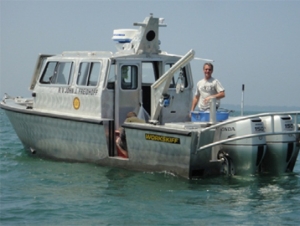

The Great Lakes Center experienced a very productive year, yielding significant research findings and increasing collaboration across the scientific community. Alexander Karatayev, director of the center since 2007, presented the center’s annual report on November 28.
“We are focusing our research on the Great Lakes,” Karatayev told the audience, “and we are becoming well known for our work.” For the period covered by the annual report—July 1, 2011 through June 30, 2012—that work included 12 projects for research and education, supported by $3,437,142 in external funding, including multiyear grants. Research scientists at the center published five peer-reviewed papers; 11 have been accepted for publication; and five have been submitted, for a total of 21 articles.
The center’s researchers have presented 25 talks, 19 of them at national, international, and regional conferences. The center also brought seven speakers to campus. “More than 30 speakers have presented at our seminars since 2007,” said Karatayev. “This has been an important part of expanding our reputation and our opportunities for collaboration.”
That collaboration has been extensive and includes research involving government agencies and national and international universities and other institutions.
Mark Clapsadl, field station manager, and Kit Hastings, field station research technician, discussed highlights of the fieldwork conducted from the facility located on Buffalo’s waterfront.
Clapsadl and Hastings provided support to many research projects undertaken by center scientists and affiliated Buffalo State faculty members. The two also installed and operated the Great Lakes Observing System (GLOS). Field station staff also continued long-term sampling of the eastern basin of Lake Erie, contributing to a valuable long-term data-collection effort.
While the Great Lakes are the center’s primary focus, Karatayev and research scientist Lyubov Burlakova, both internationally known experts in fresh-water molluscs, have continued their work in Texas, where they are conducting statewide surveys of the rare and the most valuable Unionidae (a family of freshwater mussels).
At the center's Environmental Toxicology Laboratory, scientists are studying the mechanism by which various environmental pollutants present in the Great Lakes affect human health. The primary focus of the research is to gain insight into the underlying mechanism and to identify the signaling molecule or molecules for chemo-preventive targets.
Karatayev noted that grant funding of the center’s research has increased six-fold since 2007–2008. “The Great Lakes Center has become a leader in a number of large, collaborative projects,” he said.
Some content on this page is saved in PDF format. To view these files, download Adobe Acrobat Reader free. If you are having trouble reading a document, request an accessible copy of the PDF or Word Document.
